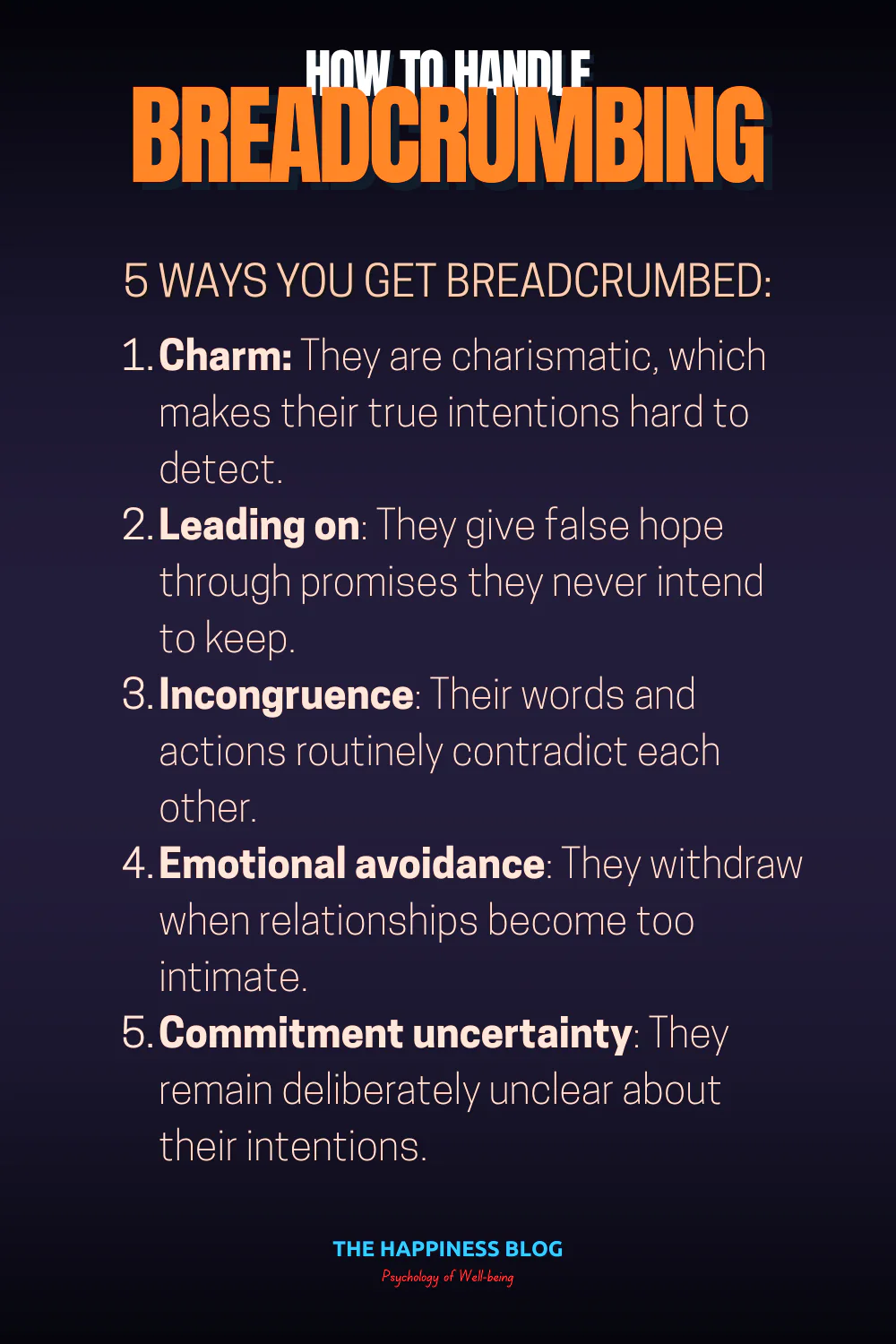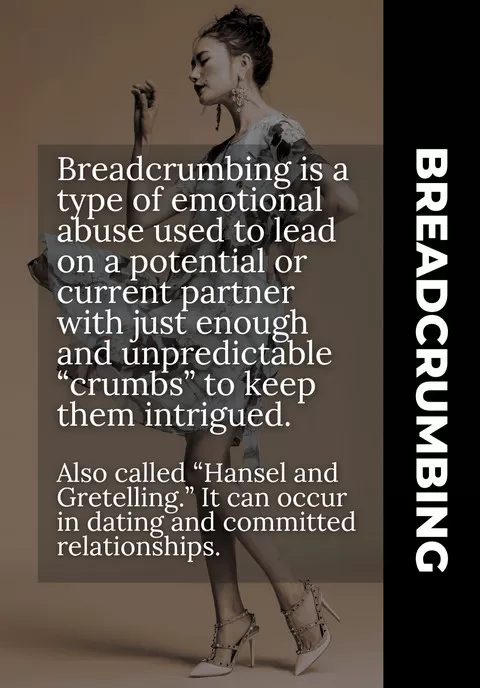Today's Thursday • 7 mins read
You receive sporadic texts from a person you’re dating. They read like your social media posts that pique your interest.
You keep your hopes alive. Because the moment after they’re distant and non-committal, they say something that makes it seem like they are interested.
That might be breadcrumbing. A manipulative dating behavior that’s become increasingly common in our digital age.
Navarro & Larrañaga (2020) define breadcrumbing as “the act of sending out flirtatious, but non-committal text messages (i.e., ‘breadcrumbs’) to lure a sexual partner without expending much effort” or “when the ‘crush’ has no intentions of taking things further, but they like the attention.”
Breadcrumbing, from the term, is like leaving a trail of breadcrumbs for someone to follow. The one who follows doesn’t know they are stepping into a trap of unrequited love.
5 Secret Tactics of Breadcrumbing Behavior
Breadcrumbing is a covert controlling tactic to keep someone invested in the relationship while being emotionally unavailable and noncommittal.
Khattar, Upadhyay, & Navarro (2023) identified five core themes in breadcrumbing behavior:
- Charm: Breadcrumbers are often charismatic, making their true intentions difficult to detect
- Leading on: They give false hope through promises they never intend to keep
- Incongruence: Their words and actions consistently contradict each other
- Emotional avoidance: They withdraw when relationships become too intimate
- Commitment uncertainty: They remain deliberately unclear about their intentions

Psychology Behind Why People Breadcrumb
Some factors behind a person’s breadcrumbing could be:
- Fear of commitment often drives breadcrumbing behavior. They want attention and validation from their target person, but do not want to handle the responsibilities of a real relationship.
- Narcissistic tendencies play a significant role. Narcissistic personalities exploit relationships for ego gratification, without considering the emotional impact on others.
- Control and power dynamics also motivate breadcrumbers. Breadcrumbers like keeping someone emotionally invested while remaining detached, as it gives them a sense of superiority and control.
- Validation seeking drives many breadcrumbers to maintain multiple potential relationships simultaneously, boosting their self-esteem through constant attention.

How to Spot Breadcrumbing: Key Warning Signs
1. Communication Patterns. Look for the distinct communication behaviors that reveal the true intentions of a breadcrumber:
- Inconsistent contact: Alternate between being highly responsive and completely absent.
- Broken promises: Frequently cancel plans or fail to follow through on commitments.
- Surface-level interactions: Conversations remain shallow despite extended contact.
- Vague responses: Avoid direct answers about their feelings or intentions.
2. Digital Red Flags. The way they interact on social media reveals their breadcrumbing patterns:
- Sporadic likes and comments on your posts without meaningful engagement.
- Viewing your stories consistently but not initiating substantial conversations.
- Late-night messages that seem designed to keep you thinking about them.
- Flirting with others publicly while maintaining private contact with you.
3. Behavioral Giveaways. Watch for these concerning patterns in their overall behavior:
- Hot-and-cold treatment that leaves you constantly questioning their interest.
- Availability only on their terms, typically when convenient for them.
- Avoiding discussions about the future or relationship status.
- Reluctance to introduce you to friends or family.
The Psychological Effects of Breadcrumbing
The intermittent reinforcement pattern of breadcrumbing creates a psychological addiction similar to gambling. Each small gesture of attention triggers hope, making it difficult to break free from the cycle.
Breadcrumbing may cause significant psychological harm. Williams (2009) found that victims report poor mental health outcomes, including depression and anxiety.
Common psychological effects include:
- Low self-esteem: The victim may blame themselves for their breadcrumber’s inconsistent behavior.
- Confusion and self-doubt: Mixed signals make the victim question their perception of reality.
- Anxiety and depression: The uncertainty can create chronic stress and emotional instability.
- Trust issues: The experience can make forming future relationships more difficult.
How to Handle Breadcrumbing: A Strategic Approach
1. Recognize the Pattern
The first step is to examine and recognize that you are being breadcrumbed.
- Trust your instincts when something feels off about their behavior patterns.
- Check for the key warning signs of breadcrumbing (given above).
2. Communicate Your Expectations
Communicate your expectations directly and clearly.
- Tell them what you want from the relationship in a clear statement. Do not hesitate. Remove all present and future ambiguity.
- Ask them what they want from the relationship. If they say they would like you to be a friend, emphasize that you will not accept being in the friend zone.
Example: “I’m looking for someone who wants to build a genuine connection. If you’re not interested in that, please let me know so we can both move forward.”
3. Focus on Actions, Not Words
Breadcrumbers are skilled at saying what you want to hear. Pay attention to their consistent actions rather than their promises or explanations.
Set boundaries with the person. Tell them what behaviors from them you will and won’t accept once you agree on a relationship status.
4. Limit Your Investment
Don’t over-invest emotionally, financially, or time-wise in someone who won’t reciprocate.
Match their level of effort rather than trying to compensate for their lack of commitment.
5. Consider Going No-Contact
If the breadcrumbing continues despite your clear communication, cutting off all contact may be necessary for your emotional well-being.

Moving Forward After Breadcrumbing
Recovering from breadcrumbing requires rebuilding your confidence and trust in dating:
Learn the Red Flags
Use this experience to develop better radar for detecting manipulative behavior early in future relationships.
Rebuild Your Self-Worth
Remember that breadcrumbing reflects the other person’s emotional limitations, not your worth as a partner. Building a positive mindset is crucial for moving forward.
Establish Dating Standards
Create clear standards for how you want to be treated and stick to them. This includes expectations for communication frequency, follow-through on plans, and emotional availability.
Practice Self-Compassion
Avoid self-blame. Many intelligent, emotionally healthy people fall victim to breadcrumbing because the manipulative patterns can be subtle initially.
Write a self-compassion letter. Take this Self-Compassion Quiz to find out how good a friend you are to yourself.
When to Seek Professional Help
Consider professional support if you have:
- Patterns of repeatedly attracting or staying with emotionally unavailable people
- Persistent anxiety or depression related to dating experiences
- Difficulty trusting new partners despite wanting to connect
- Self-esteem issues that affect multiple areas of your life
Building Healthier Relationship Patterns
Moving forward, focus on developing relationships with people who show:
- Consistency: Their words align with their actions over time
- Clear communication: They express their intentions honestly
- Emotional availability: They’re present and engaged in conversations
- Respect for your time: They honor commitments and communicate changes promptly
Breadcrumbing is one of the forms of manipulation that has also been defined as “a euphemism for leading someone on by contacting them intermittently to keep the other person interested.”
– Khattar, Upadhyay, & Navarro, Young Adults’ Perception of Breadcrumbing Victimization in Dating Relationships, 2023
Breadcrumbing vs. Other Dating Behaviors
Online dating platforms have made it easier for people to meet and connect. But it has also led to some novel fallouts.
We see new relationship trends like catfishing, grooming, objectification, gamification, and cyberstalking. Other behaviors that compete with breadcrumbing in modern dating could be benching, ghosting, haunting, orbiting, friendzoning, and slow-fading.
Understanding how breadcrumbing differs from similar behaviors helps you identify the specific problem:
- Breadcrumbing vs. Ghosting: While ghosting involves complete disappearance, breadcrumbing maintains minimal contact to keep you engaged. Ghosting leaves the victim without closure in the relationship.
- Breadcrumbing vs. Casual Dating: Casual dating involves honest communication about intentions. Breadcrumbing involves deception about one’s true level of interest.
- Breadcrumbing vs. Taking Things Slow: Someone genuinely taking things slow will still demonstrate consistent interest and clear communication about their pace.
- Breadcrumbing vs. Micro-Cheating: Micro-cheating occurs in committed relationships and involves small, subtle actions that push the boundaries of what is acceptable within the relationship. These actions do not necessarily involve physical infidelity, but they can still damage trust and intimacy.
Final Words
Don’t settle for breadcrumbs when you deserve the whole loaf.
Breadcrumbers may have their emotional limitations and fear of genuine connection. So they may try to reconnect. Recognize the patterns early and talk to them about future commitment.
Healthy relationships are based on mutual effort, respect, and genuine interest from both. If you’re not getting those, talk to them directly and leave the relationship.
• • •
√ Also Read: Why You Keep Going Back To Your Ex: Trauma Bonding Addiction
√ Please share this if you found it helpful.
» You deserve happiness! Choosing therapy could be your best decision.
...
• Disclosure: Buying via our links earns us a small commission.